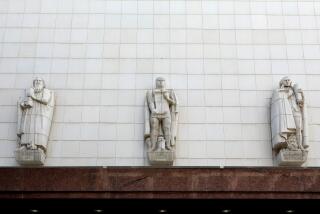At 90, jurist makes his case for not retiring yet
The words “Happy Retirement” had been smudged off the huge sheet cake gracing the 13th floor courtroom’s witness stand Tuesday. The baker got the “happy” right, but the “retirement” was a mistake.
The cake was to celebrate the 90th birthday of Los Angeles County Superior Court Commissioner Sam Bubrick, who has no intention of retiring any time soon.
For the record:
12:00 a.m. May 23, 2007 For The Record
Los Angeles Times Wednesday May 23, 2007 Home Edition Main News Part A Page 2 National Desk 2 inches; 66 words Type of Material: Correction
Court commissioner: An article in Wednesday’s California section about the 90th birthday of Los Angeles County Superior Court Commissioner Sam Bubrick incorrectly stated that commissioners are justices appointed by other judges. The only California state judges called “justice” are the jurists on the Court of Appeal and the state Supreme Court. Commissioners are attorneys selected by the judges of a court to perform certain judicial duties.
Nor did anyone want to give him any ideas along those lines.
“Every judge makes him promise not to,” Judge Steven Van Sicklen told the more than 120 judges, attorneys and staffers who packed the benches and jury box of the criminal courtroom for the luncheon in Bubrick’s honor.
They needn’t have worried.
Bubrick -- who is spry, razor sharp and looks at least two, maybe three decades younger than he is -- says he has no plans to give up the bench in the foreseeable future. He says he wouldn’t know what to do with himself if he did.
Why not retire and take some time to relax, a reporter asks, see the world, enjoy yourself?
“Enjoy? Enjoy what?” he retorts in the grumpy-but-disarming manner that he’s legendary for around the courthouse. “What the heck would I do with myself if I didn’t have this place to go to?”
Since 1950, Bubrick has driven to work at Temple Avenue and Broadway in downtown Los Angeles. He graduated from law school at Loyola University at age 33. Before law school, he spent six years as an officer in the Army during World War II, stationed in England, France and Germany.
He started his law career working with a criminal defense attorney in a building near the courthouse, defending drug dealers and accused murderers. One of his most notorious clients was Tex Watson, one of those convicted in murders committed by the Charles Manson family.
Bubrick was appointed to the bench in 1972. Commissioners are justices appointed by other judges to serve in one of the largest courts in the U.S. (Justices can also be appointed by the governor or be elected.) There is no term limit.
Bubrick was sworn in by Justice Joseph Wapner who would later go on to fame on “The People’s Court” television show.
Over the next two decades, Bubrick would preside over more than 600 jury trials. He could be tough -- particularly on attorneys who tried to argue with him or questioned his judgment -- helping to earn the nickname “Hollerin’ Sam.”
As a young criminal defense lawyer, Peter Espinoza, now a fellow judge, recalled Bubrick chastising him for trying to extol the virtues of Espinoza’s client, a drug dealer.
“Counselor, I lived in a house built by heroin,” Espinoza recalled Bubrick telling him, in a joking reference to the many drug dealers Bubrick had represented. Bubrick wasn’t going to let anyone try to paint them as good people and waste his time; he wanted attorneys to argue the law.
Espinoza said he took the advice “and we took our sentence.”
Bubrick also isn’t fond of backtalk from attorneys who don’t agree with him. “I didn’t mind raising my voice,” Bubrick recalled after the party. “When I was a lawyer, nobody ever talked back to the judge.”
Bubrick tried to retire once -- when he was 75 -- so he and his wife could travel more and spend more time together. But shortly afterward, Harriet was diagnosed with brain cancer and died. It was two months shy of their 50th wedding anniversary.
Bubrick threw himself back into work.
For the last 14 years, he has been reviewing writs of habeas corpus three days a week for Van Sicklen, the supervising judge of the criminal department.
Bubrick’s usually the first one in the office, driving from his Westwood home and arriving downtown by 6:30 a.m., sometimes griping that the courthouse elevators to his 13th-floor office are “powered by pigeons.”
One cup of coffee, and he dives into the petitions filed by prisoners who have been denied parole or have been given parole only to have the attorney general’s office or Gov. Arnold Schwarzenegger reject it.
It’s frustrating work in some ways, Bubrick said, because the few petitions they accept are usually rejected too.
“It’s political. Nobody wants to be subject to the Dukakis syndrome,” he said, referring to a paroled prisoner who committed murder after his release while the former presidential candidate was governor of Massachusetts.
Nevertheless, it’s the kind of work that is essential to the judicial system, Van Sicklen said.
Bubrick’s “heart is very big,” Van Sicklen said, when his experiences might have turned it to stone. “It’s full of gold. I wouldn’t call it love, but respect -- respect for people in prison. He’s exactly the person who should be doing this.”
Van Sicklen added that “most of us think we’re important,” only to come back from vacation and realize that everything went along just fine. Not so with Bubrick. “This is somebody who goes on vacation, and everybody realizes how much trouble they’re in.”
More to Read
Sign up for Essential California
The most important California stories and recommendations in your inbox every morning.
You may occasionally receive promotional content from the Los Angeles Times.










